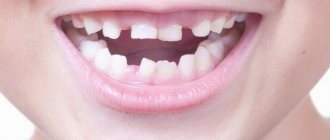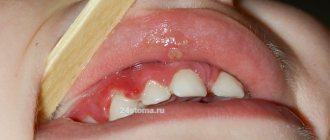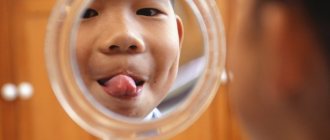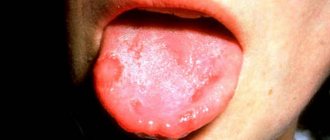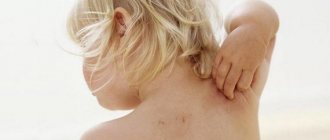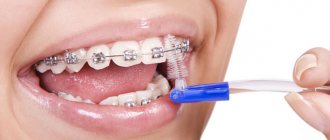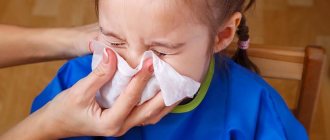A baby at the age of four months is not yet able to communicate what is bothering him, where it hurts, what factors cause discomfort. Typically, the first baby teeth begin to emerge at six months, but it is not uncommon for the middle incisors to appear in four-month-old babies. It is very important to recognize the signs of teething in order to help your baby get through this period as easily as possible.
Signs of teething in a 4 month old baby
On a note! Early teething is not considered a pathology. The age of 4-7 months is considered the norm for the appearance of the first primary incisors.
Teething Chart
The order of eruption of baby teeth
Everyone is different, but it is still important to know how most babies develop. Children's first teeth usually erupt almost simultaneously on the right and left. The sequence is as follows: first the anterior ones (incisors, canines), then the posterior ones.
It is important to understand that this pattern of teething in children is average, and in your case it may happen in a different order or at a different time. This does not necessarily indicate any violations.
Doctors have compiled an approximate, average diagram of teething in children:
Don't worry if you don't meet these standards for several months. If the parents got teeth late, most likely the children will have the same. Heredity has a very strong influence on development. The teething pattern should not become an unnecessary source of parental anxiety. This is just a guideline, like all other norms.
Both the sequence and timing of teething in children can vary greatly. Only if you are “late” by more than 6 months (for example, nothing appears until a year), it is worth discussing this with your doctor. There are genetic disorders when the rudiments of teeth do not develop at all. However, this is extremely rare. Some diseases also affect the timing of teething, but these conditions in children always manifest themselves with some more obvious symptoms.
In any case, there is no remedy that would “cut teeth” - we won’t pull them out of the jaw. We also do not regulate the cutting order. All that remains is to observe the process in children and take care of their health in general.
How many days does it last
In answering this question, it should again be recalled that all children are different and react differently to the appearance of teeth. On average, fever in babies can last 1-3 days and usually disappears immediately after teething.
But in the experience of many pediatricians, there are children whose high body temperature associated with the appearance of their first teeth lasted up to 4-5 days. Or there are cases when the fever lasts only a few hours and goes away without any intervention. In any case, you should not delay consulting a doctor, since if you have any diseases, identifying them earlier has a more favorable outcome.
What problems may arise during teething in infants?
Difficulties do not always arise. But sometimes, about 3 days before and 3 days after teething, the baby’s condition changes:
- gums swell;
- saliva flows more strongly (although a lot of it can be released without connection with teething);
- the temperature rises slightly;
- mood deteriorates (child is less active, cries more often);
- sleep becomes restless;
- stools become slightly looser and more frequent;
- your cheeks turn slightly red (no need to immediately look for allergens and change your diet).
These symptoms may not all appear, in any combination.
The difficulty is that the same symptoms, but usually stronger, can also occur in children with infections. Therefore, if your condition has changed significantly, consult your doctor.
Red flags (tell your doctor if your child has):
- temperature above 38 degrees in the absence of cold symptoms;
- a rash that is unfamiliar to you, which appeared along with a high fever;
- diarrhea, vomiting;
- lethargy;
- mouth ulcers or other sores.
- Eruption cyst (hematoma).
Assess how much the child's condition has changed. If he begins to clearly feel unwell, there is no need to attribute this to the teething of baby teeth. In this case, you need a doctor to rule out more serious problems.
What is the maximum temperature possible during this period?
How much the temperature rises when a baby’s teeth appear depends only on his individual characteristics. On average, this figure is 37.5-37.7 degrees. Sometimes this figure can reach 38 - this is also an acceptable value. It is important to take regular measurements, since infants do not regulate heat exchange well and as inflammation progresses, the temperature can increase very quickly.
A higher temperature (39-40 degrees) may indicate complications, the development of a respiratory tract infection and requires immediate medical attention.
Medicines for teething in children
When your baby is in pain, you would like to have a reliable, effective medicine that you can give and sleep peacefully. As in the case of colic, when teething, the pharmacy will offer you a variety of remedies. Pediatric experts do not advise giving any medications without a doctor's permission.
Why? Homeopathic medicines are divided into true homeopathic (containing no active substance at all, and therefore ineffective) or pseudo-homeopathic. The latter contain some amount of plant components (usually chamomile and other, more exotic plants). The first ones do not work under any conditions, including teething in children, but at least they are harmless. Homeopathic remedies for pain containing belladonna (which was not even always listed in the composition) caused many deaths and were therefore strictly prohibited in developed countries.
In our country, the Commission of the Russian Academy of Sciences recognized homeopathy as a pseudoscience, but, unfortunately, there is no strict ban on potentially dangerous drugs. Since manufacturers do not always indicate belladonna in the composition, we recommend that you generally refrain from using any homeopathic remedies for teething pain in children.
Another case is gels with a local anesthetic drug (their name ends in “-caine”: usually benzocaine or lidocaine). Medicines like these are “freezes” that are injected into the gums when treating teeth. Although these drugs are obviously effective, they have also caused many child deaths. Substances of this group affect the functioning of the heart, because the gel is quickly washed off with saliva, and the child swallows it. It is especially dangerous if the parent uses a higher dose than recommended in the instructions. This happens often because these drugs only relieve pain for a few minutes. When the baby starts crying again, the parents apply more, often exceeding the dose. Now professional communities of doctors do not recommend the use of products with local anesthetics, but this does not stop their widespread advertising.
Other symptoms accompanying fever
During teething, there may be other symptoms in addition to fever. Swelling of the gums can spread from the oral cavity to the nasal mucosa, thereby causing a slight runny nose and the discharge of a slight transparent mucous secretion. This symptom is more pronounced when the upper teeth erupt.
The appearance of baby teeth is often accompanied by excessive salivation, especially when the lower teeth erupt. This also causes a slight loosening of the stool - the stool becomes a little softer than usual.
What to do when children are teething?
The most natural and one of the most reliable ways to reduce pain is cold. Pick up an item - a “rodent” that can be put in the refrigerator. Freezing them is not recommended because it can damage the baby's delicate gums.
Often children prefer to gnaw on their parent's finger or, unfortunately, on their mother's breast. But parents may not have enough patience for a long time, so it is better to find a suitable teether.
It should be:
- whole and durable (the child should not bite off pieces that could cause choking);
- without ropes and beads (the rope can pinch the neck or break, creating a risk of choking on a bead);
- without paint with toxic components;
- just clean (no need to disinfect it).
You can refrigerate the fruit puree or put a few wet cloth toys in the refrigerator so you can replace them.
Of course, children chew not only objects that are ideal for this. But if with a teether made of one piece of silicone or a mitten with a silicone pad the child can be left alone in the playpen for some time, then with a bunch of small objects on a string around the neck or a bracelet made of beads, the same as with some fruit or vegetable, you need to look after it.
If cooling does not help, and the stress of teething is very severe, discuss taking pain relievers and fever reducers (ibuprofen is most often used) with your pediatrician. To be on the safe side, consult your doctor, but a single dose by weight (for ibuprofen is 10 mg/kg), given once at night for 3-4 days of active teething, will not cause harm.
Nutrition
Proper feeding during this period plays an important role. The diet should contain foods enriched with vitamins A, B and C. It is also necessary to include cottage cheese and milk.
Attempts to feed a child at such a moment do not always end well. Often what is eaten is released in the form of vomiting due to pain. Dehydration sets in as the temperature rises. The main thing is to constantly give the child something to drink, thereby gradually reducing dehydration and lowering the temperature. In cases where you lose control of the situation, you should call an ambulance. The pediatrician will examine you, give recommendations for care, and prescribe products that, if purchased, will make it easier for you to cope.
Should I brush my newly erupted teeth?
Dentists strongly recommend starting to take care of oral hygiene from infancy. For newly emerging teeth, they offer special silicone brushes or wipes. A simpler option is a finger wrapped in gauze. You can simply moisten it with water or use toothpastes for children under 3 years of age (they are marked 0+ and can always be swallowed). The main thing when brushing your teeth is no violence! A little more cleanliness isn't worth the stress.
| Author Fedor Katasonov | Scientific editor Maria Gantman |
